八年级英语上册Unit7Period4Comprehensivereview教案人教新目标版
2020八年级英语上册 Unit 7 Seasons Period 4 Integrated skills
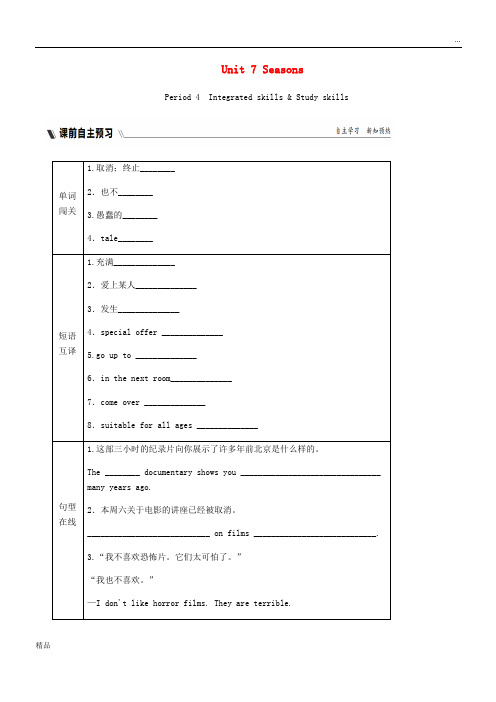
Unit 7 SeasonsPeriod 4Integrated skills & Study skills● fall inlove with… 爱上……[观察] The woman falls in love with the city when she travels.这位女士在旅行时爱上了这座城市。
—Miss Green. She makes us ________ English in an interesting way.[探究] fall in love with… 意为“爱上……”。
fall的过去式和过去分词是________和________。
如果表示“爱上某人一段时间”,要用“be in love with sb for+一段时间”。
The two young persons have been in love with each other for over two years.这两个年轻人相爱两年多了。
[注意] feel的过去式和过去分词都是felt。
[拓展] 含有fall的其他短语:fall asleep睡着fall ill生病fall down 倒塌;跌倒;落下 fall off 从……滑落A.believe inB.take part inC.come up withfall in love withD.Array●—I don't like horror films. They are terrible.—Neither do I.“我不喜欢恐怖片。
它们太可怕了。
”“我也不喜欢。
”[探究] neither用作副词,意为“也不”,放在句首,表示前面的______(肯定/否定)内容也适用于另外一个人或事物,句子必须进行部分倒装,将助动词、系动词或情态动词提到主语之前,此时也可用nor,即:Nor/Neither+助动词/情态动词/系动词+主语,表示“……也不”。
八年级英语上册Unit7复习题及答案

Provide examples of aggressive and negative intentions in context (Answer: Interrogtive: "Are you hungry?", Negative: "I didn't eat breakfast this morning")
Conclusion : Conclusion Debate : Debate Evidence : Evidence
Phrases and expressions
01
Phrases:
02
In conclusion
On the other hand
03
Phrases and expressions
Vocabulary exercise questions
3. Synonym Matching:
Match the following words with their syntax
Vocabulary exercise questions
Academic Assignment Challenge
• D. Defend
Vocabulary exercise questions
2. Fill in the Blanks:
Write the correct word to complete the sentence: "The _____ of the project was due last week." (deadline)
Reading exercises
Exercise 1
This exercise asks students to read a passage and answer comprehension questions about it. The questions will test students' understanding of the main ideas, details, and investment skills
人教版八年级英语上册Unit 7 综合素质评价含答案
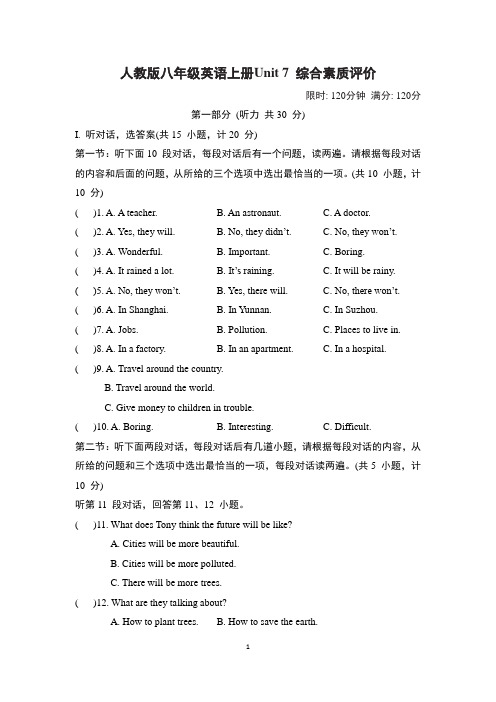
人教版八年级英语上册Unit 7 综合素质评价限时: 120分钟满分: 120分第一部分(听力共30 分)I. 听对话,选答案(共15 小题,计20 分)第一节:听下面10 段对话,每段对话后有一个问题,读两遍。
请根据每段对话的内容和后面的问题,从所给的三个选项中选出最恰当的一项。
(共10 小题,计10 分)( )1. A. A teacher. B. An astronaut. C. A doctor.( )2. A. Yes, they will. B. No, they didn’t. C. No, they won’t. ( )3. A. Wonderful. B. Important. C. Boring.( )4. A. It rained a lot. B. It’s raining. C. It will be rainy. ( )5. A. No, they won’t. B. Yes, there will. C. No, there won’t. ( )6. A. In Shanghai. B. In Yunnan. C. In Suzhou.( )7. A. Jobs. B. Pollution. C. Places to live in. ( )8. A. In a factory. B. In an apartment. C. In a hospital. ( )9. A. Travel around the country.B. Travel around the world.C. Give money to children in trouble.( )10. A. Boring. B. Interesting. C. Difficult.第二节:听下面两段对话,每段对话后有几道小题,请根据每段对话的内容,从所给的问题和三个选项中选出最恰当的一项,每段对话读两遍。
人教版八年级上册上英语unit7详细知识点
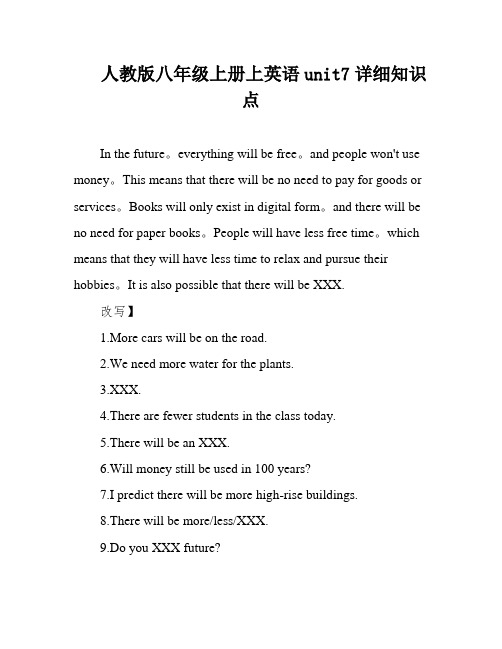
人教版八年级上册上英语unit7详细知识点In the future。
everything will be free。
and people won't use money。
This means that there will be no need to pay for goods or services。
Books will only exist in digital form。
and there will be no need for paper books。
People will have less free time。
which means that they will have less time to relax and pursue their hobbies。
It is also possible that there will be XXX.改写】1.More cars will be on the road.2.We need more water for the plants.3.XXX.4.There are fewer students in the class today.5.There will be an XXX.6.Will money still be used in 100 years?7.I predict there will be more high-rise buildings.8.There will be more/less/XXX.9.Do you XXX future?XXX weekends。
but maybe in the future。
this n will change。
For example。
scientists predict that in 200 years。
virtual XXX ina virtual world。
rather than physically being in the same place.XXX。
八年级英语Review of Units 7—12新人教版
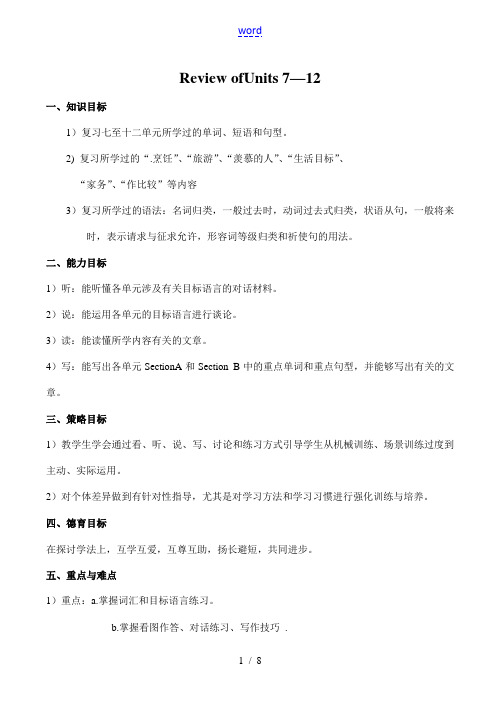
Review ofUnits 7—12一、知识目标1)复习七至十二单元所学过的单词、短语和句型。
2) 复习所学过的“.烹饪”、“旅游”、“羡慕的人”、“生活目标”、“家务”、“作比较”等内容3)复习所学过的语法:名词归类,一般过去时,动词过去式归类,状语从句,一般将来时,表示请求与征求允许,形容词等级归类和祈使句的用法。
二、能力目标1)听:能听懂各单元涉及有关目标语言的对话材料。
2)说:能运用各单元的目标语言进行谈论。
3)读:能读懂所学内容有关的文章。
4)写:能写出各单元SectionA和Section B中的重点单词和重点句型,并能够写出有关的文章。
三、策略目标1)教学生学会通过看、听、说、写、讨论和练习方式引导学生从机械训练、场景训练过度到主动、实际运用。
2)对个体差异做到有针对性指导,尤其是对学习方法和学习习惯进行强化训练与培养。
四、德育目标在探讨学法上,互学互爱,互尊互助,扬长避短,共同进步。
五、重点与难点1)重点:a.掌握词汇和目标语言练习。
b.掌握看图作答、对话练习、写作技巧.c.掌握语法的运用。
2)难点:语法和目标语言的运用。
六、教学准备1)A tape-recorder, multi-medium,3)教学课时为三课时第一课时(The First Period) Basic Practice一、Teaching process designStep 1: Warming upGreeting and review what we have learnt from Unit 7 to Unit 12.Practice the target language in Unit 7-12, do some oral work with students to create an English speaking environment.Step 2: Vocabulary1)Teach students how to seize the clues to guess the crossword and help them to finish Sentence 1—21. Check the answers:Down: 1.far 2.am 3.April 4.homework 5.house 8.smoothie 9.pizza2)Then ask students to work out their own crosswords. Choose the words from Unit 7-12 and write a clue for each word. And read the clues to their partner, and let their partner guess the words.A: It’s a very large fruit. B: Is it a water melon A: Yes, it is.1.It’s a very large fruit. )Step 3: Look, Listen and Write3a)The teacher asks students to look at the picture on P78 and listen to the four conversations , and match the conversations with the correct pictures with the number (1-4).3b)Then listen again and follow the instructions next to the pictures.Picture 1. Where did Fred do the things below? Check the cities with “√”Picture 2.How to make mushroom soup with “First, Next, Then, Finally”.Picture 3.Listen and c heck the correct restaurant with“√”Picture 4. Fill in the chart with “What, Where, How, When”Step 4: Practice with pair workIt’s up to pair work for 3c.Practice the conversations with their partners by role play for Picture 2. Begin withA: How do you make mushroom soup?B: It’s easy. First, clean and cut the ingredients.The teacher moves around the room and gives some help as needed. Ask pairs of students to show their works. Praise them for their performance.Step5: Homework1)Preview :Review of Units 7—12 on Pages 79—802)Sum up the words, phrases and sentences by reviewing Units 7-9二、Rethinking for the first period1)Successful Experience:2) Failed Lesson:第二课时(The Second Period) Pairwork一、Teaching process designStep 1: ReviewGreeting and checking their homework.Review the knowledge and grammar learnt in the six units.Step 2: PairworkPairwork4. Ask students to work in pairs to practice the target language. Then write the ingredients of their favorite snack. Finally, tell their partner how to make it. Ingredients:Pairwork 5. Write a story by chain-writing!Ask students to work with two classmates to write about an imaginary vacation.Write a sentence using a word from the box. Fold the paper so your friends can’t see what you wrote in the paper. Then take turns to add sentences after what you wrote.Pairwork6. First, ask students to listen to the tape. Next, read the song words. Then listen to the tape again. Finally, practice the song. (Leave it out)Pairwork7.Ask students to make a conversation with their partners. Imagine your lifetwentyyears from now. Write clues about it. Then look at your partner’s clues(线索). Ask questions and try to guess his future.Pairwork8. Ask students to work in pairs to practice the target language.Imagine your group is organizing a camping trip. Make a list of what you need to do and discuss who will do the things on your list. plete the chart below.Pairwork9. Ask students to work in pairs to practice the target language.Ask students to work in pairs and answer the questions below. Then discuss them with their partnersStep 3: Homework1) Sum up the words, phrases and sentences by reviewing Units 10-122) Preview Section B二、Rethinking for the second period1)Successful Experience:2) Failed Lesson:第三课时(The third Period) Review and Goal Checking for Unit 7-12一、Teaching process designStep 1: ReviewGreeting and review the content taught previously:Help students to list what they should learn. Solve their problemsStep 2: Read through Unit7-12 and List the key words& useful expressionsLet students find out which part they don’t understand. The teacher moves round the room to help them to solve the problems. Ask students to sum up the language points and list the key words& useful expressions.Step 3: Do some exercises of Unit 7-12 for Final-term ExaminationStudents take the test for twenty-five minutes. The teacher inspects the results of the examination by checking the answers. Students correct mistakes.Step 4: Goal Checking for Unit7-12After the test, the teacher suggest students review the section which they find difficult and ask their teacher for extra help or work with a peer or a study group to reinforce their progress.Ask students to sum up the problems for which they made mistakes.Step 5: Homework1) Review of Units 1—122) Study for Final-term Examination二、Rethinking for the fifth period1)Successful Experience:2) Failed Lesson:Ask all of students to get ready for Final-term examination with confidence。
八年级英语上册Unit7Review of Unit 7
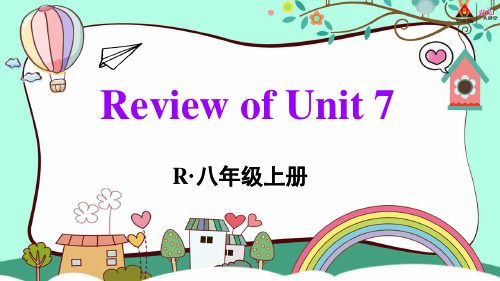
纸;纸张 (n.) 污染;污染物 (n.) 将来;未来 (n.) 污染 (v.) 环境 (n.) 行星 (n.)
earth plant part peace sea build
地球;世界 (n.) 种植(v.) 植物 (n.) 部分 (n.) 和平 (n.) 海;海洋 (n.) 建筑;建造 (v.)
play a role in sa woke up
10. 摔倒
fall down (过:fell down)
11. 在未来
in the future
即时演练
一、单项选择。
1. Now the environment is becoming worse and
语法 一般将来时
意义:表示将来某个时间要发生的动作或存在 的状态,也可表示将来经常或反复发生 的动作。
一般将来时的各种句式 (以动词work为例)
人称
肯定式
第一人称 I (We) shall/ will work.
第二人称
You will work.
第三人称 He (She, It, They) will work.
A. with
B. at C. from
D. in
5. She plays an active part _______ these poor
children.
A. in teach
B. on teach
C. in teaching
D. teach
二、根据汉语意思完成下列句子。 1. 每个人都应该参与拯救地球。 Everyone should __p_l_a_y_ __a__ __p_a_r_t _ in saving the earth. 2. 太晚了,最后我们不得不离开那里。 It was too late. We __h_a_d__ __t_o__ _le_a_v_e_ there in the end.
人教版八年级英语上册Unit7知识点归纳整理
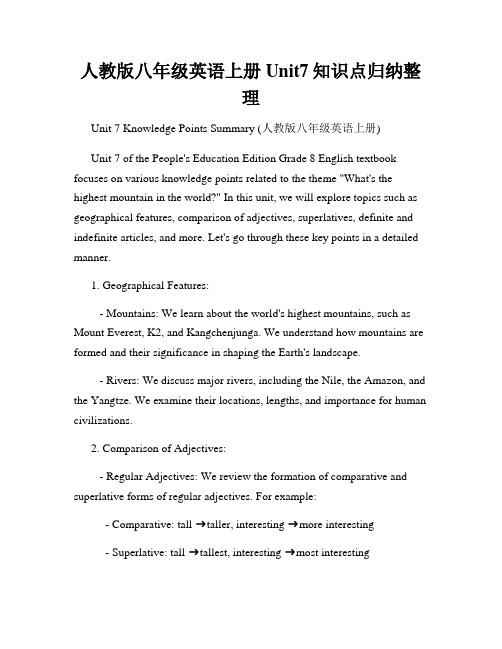
人教版八年级英语上册Unit7知识点归纳整理Unit 7 Knowledge Points Summary (人教版八年级英语上册)Unit 7 of the People's Education Edition Grade 8 English textbook focuses on various knowledge points related to the theme "What's the highest mountain in the world?" In this unit, we will explore topics such as geographical features, comparison of adjectives, superlatives, definite and indefinite articles, and more. Let's go through these key points in a detailed manner.1. Geographical Features:- Mountains: We learn about the world's highest mountains, such as Mount Everest, K2, and Kangchenjunga. We understand how mountains are formed and their significance in shaping the Earth's landscape.- Rivers: We discuss major rivers, including the Nile, the Amazon, and the Yangtze. We examine their locations, lengths, and importance for human civilizations.2. Comparison of Adjectives:- Regular Adjectives: We review the formation of comparative and superlative forms of regular adjectives. For example:- Comparative: tall ➜ taller, interesting ➜ more interesting- Superlative: tall ➜ tallest, interesting ➜ most interesting- Irregular Adjectives: We study the comparison of irregular adjectives, such as good, bad, little, many, etc. For example:- Comparative: good ➜ better, bad ➜ worse, little ➜ less, many ➜more- Superlative: good ➜ best, bad ➜ worst, little ➜ least, many ➜ most3. Superlatives:- Superlative Adjectives: We learn to use superlative adjectives to compare three or more things. For example:- Everest is the highest mountain.- The Amazon is the longest river.- Superlative Adverbs: We also explore the use of superlative adverbs. For example:- The goods were manufactured most efficiently in that factory.- She spoke most fluently among all the participants.4. Definite and Indefinite Articles:- Definite Article "the": We understand when and how to use "the" before nouns. For example, we use "the" when referring to specific objects, unique items, or things previously mentioned.- The Eiffel Tower is a famous landmark.- I lost the key that you gave me yesterday.- Indefinite Article "a/an": We learn when to use "a" or "an" before countable singular nouns. For example, "a" is used before consonant sounds, while "an" is used before vowel sounds.- She bought a book about space travel.- He is an honest person.5. Expressing Opinions:- We practice expressing personal opinions using adjectives, adverbs, and comparative/superlative forms. For example:- I think Mount Everest is the most fascinating mountain.- In my opinion, the Amazon River is the most important river in the world.6. Using Comparatives in Context:- We apply comparative forms in various contexts, such as discussing prices, distances, and abilities. For example:- This laptop is cheaper than that one.- London is further north than Rome.- She runs faster than her sister.These knowledge points provide a comprehensive understanding of Unit 7 in the People's Education Edition Grade 8 English textbook. By mastering these concepts, students will be equipped with the necessary language skills to describe geographical features, compare objects, and express opinions confidently. With further practice and application, they will enhance theiroverall English competence, enabling them to communicate effectively in various situations.。
冀教版八年级英语上册 Unit 7 Review【精品课件】

Or play my favourite CD again.
I like to colour,paint and draw. Sometimes I'm glad to be alone—
how to fish? I would love to have a hobby like that.”
His grandfather was happy.He smiled at his grandson and said,
“Of course! I would love to teach you how to fish.When I get home,
I will send you a fishing rod and some hooks.When I come for my next visit,you and I will go fishing.Imagine the huge fish we will
catch.Imagine the fun we will have!”
Ⅱ Articles _A__h_a__p_p_y__c_h__i_ld__h__a_s_a__h__o_b_b__y_._______________________________ _I _h_a_v_e_a_n__id_e_a_!_________________________________ _____________________________________________ I can use “a”,“an” and “the” properly. ☆☆☆☆☆
Unit 7 Enjoy Your Hobby
Unit Review
Building Your Vocabulary
冀教版-英语-八上-7单元-Review课件

I could collect more hockey cards,
For my favourite activity.
Or play my favourite CD again.
I like to colour,paint and draw. Sometimes I'm glad to be alone—
Grammar in Use
green covers.” What ____a____strange hobby!It is very hard to find books with green covers. He spends a lot of time in bookstores. When he sees ____a____ good book with a green cover,he adds __t_h_e__ book to his collection.His dream is to cover __t_h_e__ wall in his bedroom with just green books.Strange, you might say,but that's his hobby!
how to fish? I would love to have a hobby like that.”
His grandfather was happy.He smiled at his grandson and said,
“Of course! I would love to teach you how to fish.When I get home,I will send you a fishing rod and some hooks.When I come for my next visit,you and I will go fishing.Imagine the huge fish
冀教八年级英语上册unit7 Review 课件(共22张PPT)
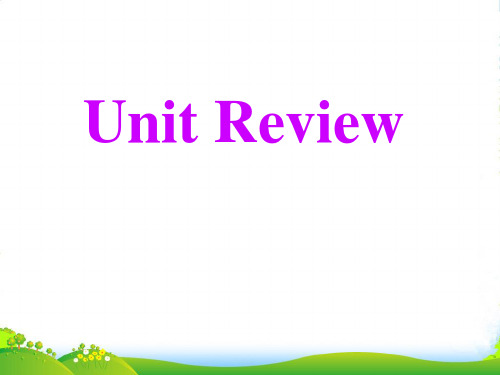
二、V-ing形式的基本用法
1. 作主语
作主语时常表示概括性或一般性的行为。 有时可以用it作形式主语。如:
Saying so much is useless. = It is useless saying so much. 多说无用。
2. 作表语
作表语时表示主语的内容。如:
B. to work D. to be working
4. I like ___A___, but I don't like ______ right
now.
A. singing; to sing
B. to sing; singing
C. singing; singing D. to sing; to sing
③ adv.: alone.
④ pron.: myself.
⑤ prep.: through.
⑥ adj.: giant, wide, enjoyable, fresh, full, popular, wonderful, difficult, alone, fragile.
II.词组、句型:
send for take part in get out of have fun doing join a club make a report feel proud go through the door
A. reading; returning B. to read; to return C. reading; to return D. to read; returning
Homework
Write a paragraph about your hobby and tell it to
八年级英语上册Unit7全单元课件
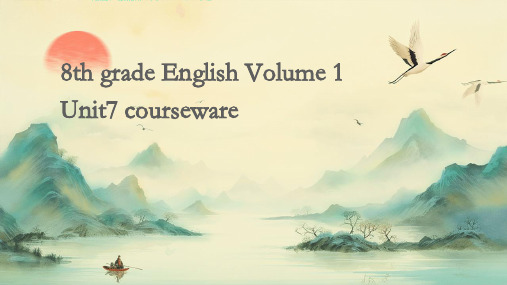
2. To develop students' comprehension and analytical skills through close reading of selected texts.
4. To foster students' creative writing abilities through guided writing exercises.
Vocabulary expansion
扩展词汇列表
在学习完一个单元后,总结并扩 展与本单元主题相关的其他重要
词汇,帮助学生扩大词汇量。
词汇卡片制作
鼓励学生制作词汇卡片,将新学的 词汇记录下来,以便随时复习和巩 固。
阅读与词汇积累
推荐适合学生水平的英文读物,引 导学生在阅读中积累新的词汇,并 学习如何在实际语境中运用这些词 汇。
01
Unit Overview
Unit objectives
1. To introduce students to the concept of irony and its use in literature.
3. To enhance students' vocabulary and grammar skills through interactive and engaging activities.
总结词
讲解口语表达技巧
详细描述
介绍并解释有效的口语表达技巧,如语音语调、连读、停顿等,帮助学生更好地掌握英语口语的运用。
Oral Practice Tasks
总结词
布置口语练习任务
详细描述
设计各种口语练习任务,如角色 扮演、小组讨论、即兴演讲等, 让学生在实践中锻炼口语表达能 力。
人教版8年级上册 Unit 7 Period 4
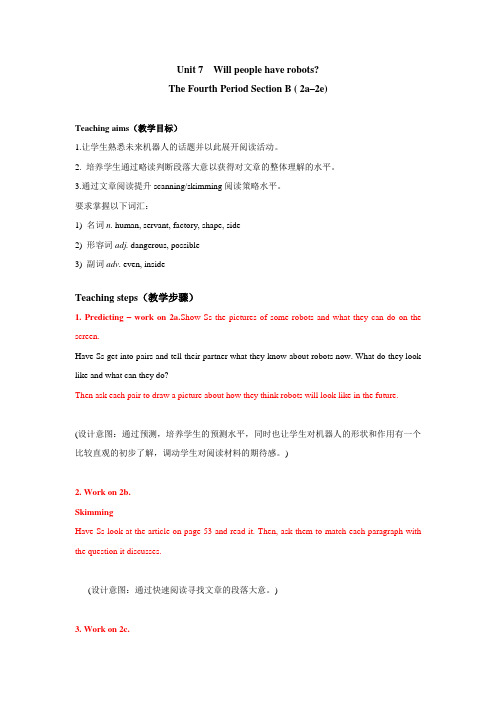
Unit 7 Will people have robots?The Fourth Period Section B ( 2a–2e)Teaching aims(教学目标)1.让学生熟悉未来机器人的话题并以此展开阅读活动。
2. 培养学生通过略读判断段落大意以获得对文章的整体理解的水平。
3.通过文章阅读提升scanning/skimming阅读策略水平。
要求掌握以下词汇:1) 名词n. human, servant, factory, shape, side2) 形容词adj. dangerous, possible3) 副词adv. even, insideTeaching steps(教学步骤)1. Predicting – work on 2a.Show Ss the pictures of some robots and what they can do on the screen.Have Ss get into pairs and tell their partner what they know about robots now. What do they look like and what can they do?Then ask each pair to draw a picture about how they think robots will look like in the future.(设计意图:通过预测,培养学生的预测水平,同时也让学生对机器人的形状和作用有一个比较直观的初步了解,调动学生对阅读材料的期待感。
)2. Work on 2b.SkimmingHave Ss look at the article on page 53 and read it. Then, ask them to match each paragraph with the question it discusses.(设计意图:通过快速阅读寻找文章的段落大意。
Unit 4 Review 课件(共26张PPT) 人教版英语八年级上册
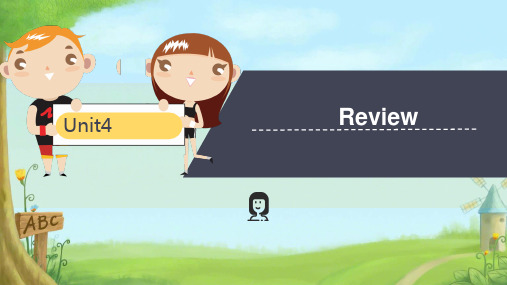
The best dancer
Gao Shuo
The best painter
The best writer
The most creative person
Reason
She can tell jokes.
He is good at Hip hop dance.(街舞)
In my group,...thinks the best school is No. 3 Middle School because it is the most beautiful. The best supermarket is Lianmin Supermarket because it has the best quality things and the best service. The best restaurant is Rui Jia Restaurant because it has the most delicious food. ...thinks...
little
far
比较级
better worse more
less farther further
最高级
best worst most least farthest furthest
Let’s chant
最高级,很容易,一般词尾加est。(cheap-the cheapest) 词尾若有哑音e, 直接就加st。(close-the closest) 重读闭音节, 单辅音字母要双写。(big-the biggest) 辅音字母加上y, 记得把y变为i。(friendly-the friendliest) 多音节,考考你,the most到底加哪里? (popular-the most popular)
Unit7Review单元复习课件冀教版英语八年级上册

A. a
B. an
C. the D. /
【解析】在乐器前面通常要用 定冠词the,故选C。
返回
11. [2023 天津] My mother is making ____C____ apple pie
and I want to try ________ piece.
A. a; an
B. a; 不填
A. the
B. a C. an
D. /
返回
15. — Who is _____A___ man in black
— He is Mr. Jones, ________ professor in our college.
A. the; a
B. a; a C. a; the
D. the; an
返回
短文填空 What do you like to do in 1.___y_o_u_r___ (you) spare time
A. A
B. An
C. The
D. /
【解析】句意:本昨天看了《猫和老鼠》。 这部 卡通片使他笑了。 此空特指前文提到的《猫和老 鼠》这部卡通片,用定冠词the 表特指,故选C。
返回
14. The museum is so fantastic that I want to visit it
____B____ second time.
返回
For example, some are interested in 3. __co_l_l_ec_t_i_n_g___ (collect) things like stamps and concert 4.__t_ic_k_e_t_s__ (ticket). And some like to keep postcards. For me, I like 5. __g_a_r_d_e_n_i_n_g_ (garden).
新目标初中英语课件八年级上册Review of units 7-12Period 4

Guess her or his future
A : Are you going to live in Beijing ? B : Yes, I am . A : Are you going to be an actor ? B : No, not an actor . Another kind of
母牛
serious 严肃的
hen
母鸡
lay
下蛋
Let’s talk
What do you think of animals? What are your favorite animals and why?
Hi kids! I’m … I think the dog is the most beautiful animal …
• I am Li Yuying . I am interested in the places of interests in Beijing. So I am going to be a tour guide .
My name is Liu Jingjing.
I am good at writing.
creative job . A : OK . Are you… Forbidden City 紫禁城 famous ring creative primary school
The Oriental Pearl TV Tower
cooker interesting
A : Are you going to live in Shanghai ? B :Yes, I am . A : Are you going to be a cook ? B : Yes, I think it’s an interesting job .
【教案】八年级英语上册Unit7Period4Comprehensivereview教案人教新目标版
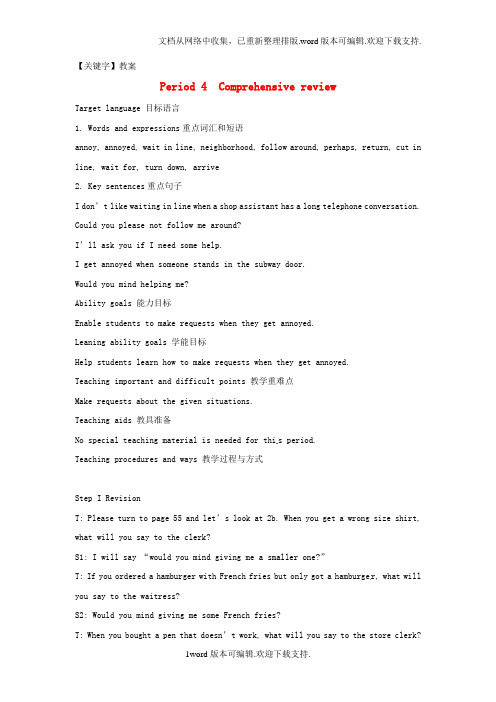
【关键字】教案Period 4 Comprehensive reviewTarget language 目标语言1. Words and expressions重点词汇和短语annoy, annoyed, wait in line, neighborhood, follow around, perhaps, return, cut in line, wait for, turn down, arrive2. Key sentences重点句子I don’t like waiting in line when a shop assistant has a long telephone conversation. Could you please not follow me around?I’ll ask you if I need some help.I get annoyed when someone stands in the subway door.Would you mind helping me?Ability goals 能力目标Enable students to make requests when they get annoyed.Leaning ability goals 学能目标Help students learn how to make requests when they get annoyed.Teaching important and difficult points 教学重难点Make requests about the given situations.Teaching aids 教具准备No special teaching material is needed for thi s period.Teaching procedures and ways 教学过程与方式Step I RevisionT: Please turn to page 55 and let’s look at 2b. When you get a wrong size shirt, what will you say to the clerk?S1: I will say “would you mind giving me a smaller one?”T: If you ordered a hamburger with French fries but only got a hamburge r, what will you say to the waitress?S2: Would you mind giving me some French fries?T: When you bought a pen that doesn’t work, what will you say to the store clerk?S3: Would you mind giving me a new pen? This pen doesn’t work.Step II Reading (3a, P56)This activity provides reading practice with the target language.T: Read the article by yourselves. Look at the title “I can’t stand it!” What kind of emotion does it show?Ss: Angry, unhappy...T: You are right. There are some things that are annoying in the article. Please underline them.Three minutes later.T: Please read th e sentences you underlined.S1: Waiting in line when a shop assistant has a long telephone conversation.S2: Shop assistants follow me around.S3: I get annoyed when someone talks to me while I am reading.T: Great. What do people do when annoying things happen? Please circle them in the article. Then read them to the class.After students finish it, let them read what they have circled.S1: Would you mind helping me?S2: Could you please not follow me around? I’ll ask you if I need some help.S3: When it happens, I usually talk to the person because I want to be polite. Then let students work in pairs, choose a situation and role play it. For example, a student pretends to be a shop assistant making phone call, the other gets annoyed and makes request.Step III Writing (3b, P56)T: Look at the two pictures in activity 3b. I’ll ask some students to tell what’s happening in each picture.S1: In Picture 1, some people want to get on the subway. But a man is standing in the subway door.S2: There are many people in Picture 2. They are waiting in line, but a boy wantsto cut in line.T: Very good. Imagine you are the people in the pictures, what will you do? Please complete the sentences on your own.Sample answers:Picture 1:When this happens, I would say, “would you mind stepping aside?”Picture 2:When this happens, I would say, “Could you please wait in line?”Step IV Groupwork (4, P56)This activity gets students to speak, wri te and use the target language.T: Please read the dialogue, make similar dialogues, ask your classmates the things that annoy them and what they usually do with them. Then fill in the chart with their names, problems and actions.Several minutes later, check the students’ answers.Language tips:line n.行,行列The children stood in a line.wait in line 排队等候cut in line=go in front of other people who are waiting 加塞return v. give back, t o give or send something back, or to put something back in its placereturn something to something / somebodyI returned the books to the library.annoy v. to make someone feel slightly angry and unhappy about somethingIt really annoys me when I see people dropping litter.She annoyed him with her stupid questions.annoying adj. making you feel slightly angryan annoying habit of interruptingThe annoying thing is he’s usually right.It’s annoying th at we didn’t know about this before.Step V Word review (1, P57)In this step, students will do some practice to review several key words.T: Please look at the words and phrases in the box on page 57. Do you know their meanings? P lease fill in the blanks with proper forms of these words to complete these sentences.Then ask students to read these sentences and make sure that all the students understand the use of these words. If necessary, give some explanations. Then let them make sentences with these words to make sure they really know how to use these words in sentences.Step VI Homework (2, P57)T: Look at the picture and talk about it.S: There are three people in the picture. Father is playing the guitar and the music is noisy. Mother is telephoning. Her voice is very loud. Their son is playing football in the room.T: Very good. If this is your neighbor family, do you find them annoying? If you do, please write a letter to them complaining about these annoying things. That is homework for today.A sample letter:Dear Mr and Mrs Harris,Welcome to be our neighborhood. Would you mind not telephoning so loudly? Would you mind turning down the music? Playing the guitar is so wonderful, but please don’t play it at night. Would you mind not playing football in the room?Thank you very much.Yours sincerely,Dick此文档是由网络收集并进行重新排版整理.word可编辑版本!。
新人教八年级上册英语Review of Unit 7
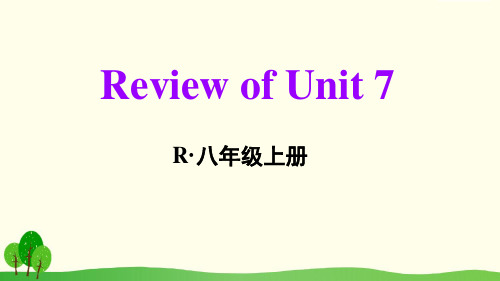
例:今天下午有一场精彩的篮球比赛。
状元成才路
There will be a nice basketball game
状元成才路
this afternoo般疑问句形式 Will there be +主语 +其他?
状元成才路
year with our effort.
状元成才路 状元成才路
三、用括号内所给动词的适当形式填空。
1. I promise I _w__il_l_s_e_n_d_/a_m__g_o_i_n_g__to__s_en__d_ (send)
during 在……期间 (prep.)
holiday 假期;假日 (n.)
word
单词;词 (n.)
phrases
1. 免费
be free
2. 活到两百岁 live to be 200 years old
3. 100年后
in 100 years
4. 更少使用地铁 use the 状元成才路 subways less
3. 环境将处于极大的危险之中。
The environment will be __in__ _g_r_e_a_t_ _d_a_n_g_e_r_. 4. 你将来打算做什么?
What are you going to do __in__ __t_h_e__ __fu_t_u_r_e_?
状元成才路
5. 人们将会活到200岁。 状元成才路
3. fewer是few的比较级,其后只接可数名词的复数 形式,意思是“较少的,更少的”。 例如:在那所学校里我的朋友比较少。 I have fewer friends in that school.
- 1、下载文档前请自行甄别文档内容的完整性,平台不提供额外的编辑、内容补充、找答案等附加服务。
- 2、"仅部分预览"的文档,不可在线预览部分如存在完整性等问题,可反馈申请退款(可完整预览的文档不适用该条件!)。
- 3、如文档侵犯您的权益,请联系客服反馈,我们会尽快为您处理(人工客服工作时间:9:00-18:30)。
Period 4 Comprehensive reviewTarget language 目标语言1. Words and expressions重点词汇和短语annoy, annoyed, wait in line, neighborhood, follow around, perhaps, return, cut in line, wait for, turn down, arrive2. Key sentences重点句子I don’t like waiting in line when a shop assistant has a long telephone conversation. Could you please not follow me around?I’ll ask you if I need some help.I get annoyed when someone stands in the subway door.Would you mind helping me?Ability goals 能力目标Enable students to make requests when they get annoyed.Leaning ability goals 学能目标Help students learn how to make requests when they get annoyed.Teaching important and difficult points 教学重难点Make requests about the given situations.Teaching aids 教具准备No special teaching material is needed for thi s period.Teaching procedures and ways 教学过程与方式Step I RevisionT: Please turn to page 55 and let’s look at 2b. When you get a wrong size shirt, what will you say to the clerk?S1: I will say “would you mind giving me a smaller one?”T: If you ordered a hamburger with French fries but only got a hamburge r, what will you say to the waitress?S2: Would you mind giving me some French fries?T: When you bought a pen that doesn’t work, what will you say to the store clerk?S3: Would you mind givi ng me a new pen? This pen doesn’t work.Step II Reading (3a, P56)This activity provides reading practice with the target language.T: Read the article by yourselves. Look at the title “I can’t stand it!” What kind of emotion does it show?Ss: Angry, unhappy...T: You are right. There are some things that are annoying in the article. Please underline them.Three minutes later.T: Please read th e sentences you underlined.S1: Waiting in line when a shop assistant has a long telephone conversation.S2: Shop assistants follow me around.S3: I get annoyed when someone talks to me while I am reading.T: Great. What do people do when annoying things happen? Please circle them in the article. Then read them to the class.After students finish it, let them read what they have circled.S1: Would you mind helping me?S2: Could you please not follow me around? I’ll ask you if I need some help.S3: When it happens, I usually talk to the person because I want to be polite. Then let students work in pairs, choose a situation and role play it. For example, a student pretends to be a shop assistant making phone call, the other gets annoyed and makes request.Step III Writing (3b, P56)T: Look at the two pictures in activity 3b. I’ll ask some students to tell what’s happening in each picture.S1: In Picture 1, some people want to get on the subway. But a man is standing in the subway door.S2: There are many people in Picture 2. They are waiting in line, but a boy wantsto cut in line.T: Very good. Imagine you are the people in the pictures, what will you do? Please complete the sentences on your own.Sample answers:Picture 1:When this happens, I would say, “would you mind stepping aside?”Picture 2:When this happens, I would say, “Could you please wait in line?”Step IV Groupwork (4, P56)This activity gets students to speak, wri te and use the target language.T: Please read the dialogue, make similar dialogues, ask your classmates the things that annoy them and what they usually do with them. Then fill in the chart with their names, problems and actions.Several minutes later, check the students’ answers.Language tips:line n.行,行列The children stood in a line.wait in line 排队等候cut in line=go in front of other people who are waiting 加塞return v. give back, t o give or send something back, or to put something back in its placereturn something to something / somebodyI returned the books to the library.annoy v. to make someone feel slightly angry and unhappy about somethingIt really annoys me when I see people dropping litter.She annoyed him with her stupid questions.annoying adj. making you feel slightly angryan annoying habit of interruptingThe annoying thing is he’s usually right.It’s annoying th at we didn’t know about this before.Step V Word review (1, P57)In this step, students will do some practice to review several key words.T: Please look at the words and phrases in the box on page 57. Do you know their meanings? P lease fill in the blanks with proper forms of these words to complete these sentences.Then ask students to read these sentences and make sure that all the students understand the use of these words. If necessary, give some explanations. Then let them make sentences with these words to make sure they really know how to use these words in sentences.Step VI Homework (2, P57)T: Look at the picture and talk about it.S: There are three people in the picture. Father is playing the guitar and the music is noisy. Mother is telephoning. Her voice is very loud. Their son is playing football in the room.T: Very good. If this is your neighbor family, do you find them annoying? If you do, please write a letter to them complaining about these annoying things. That is homework for today.A sample letter:Dear Mr and Mrs Harris,Welcome to be our neighborhood. Would you mind not telephoning so loudly? Would you mind turning down the music? Playing the guitar is so wonderful, but please don’t play it at night. Would you mind not playing football in the room?Thank you very much.Yours sincerely,Dick。
